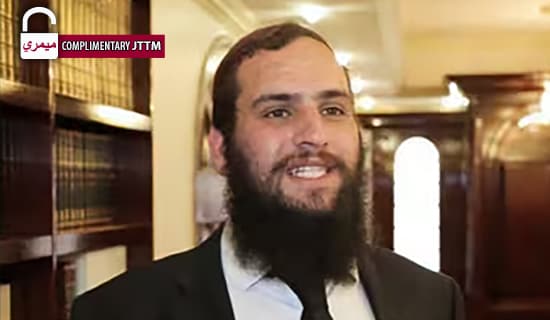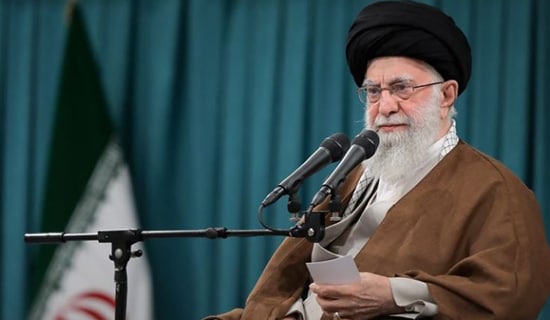Introduction
In an unexpected move on November 15, 2021, Syrian President Bashar Al-Assad issued a decree abolishing the position of Syria's Grand Mufti, which has always been held by a member of Syria's Sunni majority, and transferring his powers to the Fiqh (Jurisprudence) Council, subordinate to the Ministry of Religious Endowments. Formed in 2018, this council includes several dozen clerics from all schools of Islam, including Shi'ites, as well as members of other religions. The immediate implication of the decree was the dismissal of Grand Mufti Ahmad Badr Al-Din Hassoun, who had served in this position since 2004 and was known for his utter loyalty to Assad. His loyalty was evident especially after the outbreak of the Syrian uprising in 2011, when he issued statements and fatwas (religious rulings) serving the policy of the regime and presented the opposition and the rebels as terrorists who must be fought. He was even dubbed "the Mufti of the explosive barrels" after he justified the regime's use of this weapon against the rebels.
In light of all this, Assad's abolition of the Mufti's position was received with surprise. Some ascribed it to a statement he made several days earlier in which Hassoun gave a highly controversial interpretation of a Quranic verse. Others pointed to a years-long struggle between Mufti Hassoun and the Minister of Religious Endowments, Muhammad 'Abd Al-Sattar Al-Sayyid, for power and influence in the religious establishment.
However, opposition elements contended that the abolition of the Mufti's position had deeper and more dangerous reasons and implications, which would impact Syria's identity and the lives of its Sunni citizens. While they expressed no sorrow over the removal of Hassoun, who is a regime loyalist, they warned of the danger inherent in the abolition of the position of the Sunni Mufti and the transfer of his powers to the Fiqh Council, which includes Shi'ite clerics as well as Sunni ones. The number of Shi'ites in this council is unclear, but according to some opposition elements there are between seven and ten. Oppositionists also argued this is another step in the strategic plan of Assad – who belongs to the Alawite sect[1] – and of his major ally, Iran, to "Shi'ize" Syria, i.e., to increase Iran's influence in it. Until now this plan has been manifested in settling and naturalizing Shi'ite migrants in Syria, and in establishing Shi'ite rituals and elements of Shi'ite culture in the country, among other measures.[2] According to oppositionists, the greatest danger lies in a Shi'ite takeover of the state institutions, and especially of the religious establishment, which may lead to changes in legislation, in the religious discourse and in religious rulings. They warned this could reach the point of persecution against Syria's Sunni population and of changing the country's historically Sunni identity.
Therefore, on November 20, 2021, five days after the issuance of Assad's decree, the Turkey-based Syrian Islamic Council, which is a source of authority for Sunni Syrian organizations opposed to the Assad regime, announced the appointment of its head, Osama 'Abd Al-Karim Al-Rifa'i, as Syria's Grand Mufti, in a bid to counter what it perceives as the regime's Shi'ization campaign.
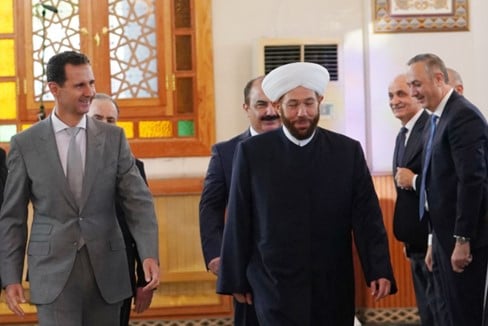
Ahmad Badr Al-Din Hassoun, until recently the Grand Mufti of Syria, with President Assad (source: Alhurra.com, November 16, 2021)
This report reviews Assad's decree abolishing the position of Syrian Grand Mufti, and the responses to it in Syria, especially among the opposition.
Assad Decree Abolishes Position Of Grand Mufti, Transfers His Powers To Endowments Ministry
As stated, on November 15 Assad issued Legislative Decree No. 28/2021, abolishing the position of Grand Mufti, which had been held for 17 years by Ahmad Badr Al-Din Hassoun, and transferring his powers to the Fiqh Council, subordinate to the Ministry of Religious Endowments. The decree is an amendment to Law 31 of 2018 which sets out the role and the powers of the Ministry of Endowments and of the Grand Mufti. This law also established the Fiqh Council, which is headed by the Endowments Minister and includes dozens of clerics from the various schools of Islam – including the Grand Mufti himself – as well as Christian clerics.[3] Article 1 of Assad's decree redefines the council's makeup, omitting the Grand Mufti from its membership. Article 2 lists the council's new functions, which are essentially those of the Grand Mufti.[4] The decree also abolishes some articles of Law 31, including the article regarding the appointment and the functions of the Grand Mufti of the Syrian republic, as well as the article empowering the Minister of Religious Endowments to appoint local muftis in the various governorates.
The Syrian daily Al-Watan, which is close to the Assad regime, clarified that the decree had "abolished the position of the Grand Mufti of the republic," and that "now all jurisprudential powers reside with the Fiqh Council." The daily also reported that Endowments Minister 'Abd Al-Sattar Al-Sayyid had decided that Grand Mufti Hassoun would retire on October 25, 2021.[5]

Assad abolishes the position of Grand Mufti (source: Alaraby.co.uk, November 17, 2021)
Possible Reasons For The Mufti's Dismissal: Controversial Interpretation Of Quran, Or Conflict With Endowments Minister
The Syrian regime provided no explanation for the issuance of the decree, leaving the media inside and outside Syria to speculate on the possible reasons for Hassoun's removal and for the abolition of the position itself. Some of them ascribed the decision to an incident involving Hassoun that had occurred several days earlier and had sparked and uproar. Eulogizing a famous singer from Aleppo, Hassoun said that Quran 95:4-5 ("Indeed, We created humans in the best form; But We will reduce them to the lowest of the low") is a reference to Syria, and conveys that the Syrians are the best people created by Allah, but that those who have left it are the worst.
Hassoun's statement evoked furious reactions on social media from members of the Syrian opposition, who accused him of using the Quran to attack the Syrian refugees who were forced to leave the country. Several days later, in an unprecedented move, harsh criticism of the Mufti was also voiced by the Ministry of Religious Endowments itself. The Ministry's Fiqh Council issued a pointed statement against him, albeit without mentioning his name, condemning his "non-standard" interpretation of the Quranic verses and calling it a "distortion" and an "error." The statement said that the speaker (i.e., Hassoun) had offered "confusing interpretations based on his whims and interests," and that his interpretation was "not based on expert knowledge of the principles of Quranic exegesis." The statement even compared this interpretation to the conduct of extremist organizations, saying that "the way of the extremists and takfiris [i.e., those who accused fellow Muslims of heresy] is to distort the interpretation of Quranic verses based on their own goals and in a manner that suits their takfiri objectives." [6]
However, some sources claimed that the ministry's attack on Hassoun, and the decision to abolish his position, stemmed from a quiet conflict that had been ongoing for years within the religious establishment between Mufti Hassoun and the Endowments Ministry under Minister Al-Sayyid. According to these sources, the conflict started even before Hassoun's appointment as Grand Mufti in 2004, when Al-Sayyid, who was serving as deputy minister of endowments, tried to prevent his appointment. Upon Al-Sayyid's appointment as minister in 2007, the hostility between the two grew. Law 31 of 2018 granted broader powers to the ministry while limiting the Grand Mufti's term in office to three years, with a possibility of extension on the recommendation of the minister himself. This, said the sources, exacerbated the conflict, which has now been finally decided in Al-Sayyid's favor. The sources also noted that in the last two years Hassoun has largely been absent from the public eye.[7]
Syrian Opposition: This Is A Blow To Syria's Sunni Identity And Another Step Towards Its Shi'ization
However, some oppositionist elements, especially Islamic elements close to Turkey, contend that the real reason for the Mufti's removal is an attempt by President Assad to undermine the status of Syria's Sunni majority. They argued that the abolition of the Sunni Mufti's position and the transfer of his powers to a council consisting of clerics from different schools, sects and religions – including Shi'ites – is a blow to Syria's Sunnis, since the Sunni sect will no longer be the sole source of authority for religious rulings and personal status laws in Syria. They also claimed that this is another step in Iran's plan to turn Syria into a Shi'ite country, which complements the years-long effort to change the country's demographic makeup by expelling Sunni Syrians, taking their land, and replacing them with naturalized Shi'ite migrants.
For example, Muti' Al-Batin, the spokesperson for the Syrian Islamic Council, which was founded in 2014 in Istanbul and is a source of authority for Sunni Syrian organizations opposed to the Assad regime, said on November 16 that Assad's move is aimed at turning the Sunnis into a weak minority and Syria into a Shi'ite stronghold. He said: "The danger in abolishing the position of Syrian Mufti does not lie in the dismissal of Mufti Ahmad Hassoun, who was a lackey of the regime, but in the blow it deals to the position of the Mufti, [a move that is] aimed at completing the plan to change Syria's demographic and religious identity." He added: "This [move] not only harms Syria's Muslims and Sunnis, but paves the way for the turbaned [clerics] of [the Iranian] Jurisprudent [i.e., clerics loyal to Iranian leader Khamenei] to mount the pulpit in the great Umayyad Mosque in Damascus, the capital of the greatest Islamic civilization… Therefore, this [act of] aggression is aimed at all Muslims and Arabs, and at their religion, their culture, their history and their future." He stated further: "By canceling the position of Mufti, Assad is preparing the ground for Iran's intervention in religious rulings in Syria, and consolidating [Iran's] presence in Syria's religious arena…" Al-Batin announced that the Syrian Islamic Council would consider appointing its own Grand Mufti for Syria.[8]
Syrian journalist Hussein 'Abd Al-'Aziz wrote on November 19 that the regime's goal in abolishing the position of Mufti was to strengthen the Shi'ite influence in the country, including on the religious level. He wrote: "The meaning of the complete abolition of the position of Mufti goes far beyond the [specific] case of Hassoun [and his interpretation of the Quranic verses]. It also has nothing to do with the years-long conflict between Hassoun and Endowments Minister 'Abd Al-Sattar Al-Sayyid, contrary to what some have claimed… This issue goes back to 2018, when the regime completed its takeover of the Damascus area and almost completed its demographic rearrangement of the Sunni regions, from the Damascus area in the south to Homs and Aleppo in the north [i.e., the settlement and naturalization of Shi'ites in these areas]. That year, Assad issued Law 31, regulating the role of the Endowments Ministry. [This law was] a direct follow-up to the efforts to weaken the Sunnis [in Syria]… Because, for the first time in Syria's [history], a so-called jurisprudence council was formed to conduct jurisprudential and religious studies and discuss [new] religious rulings while applying its reasoning to contemporary religious issues, so as to integrate the jurisprudence of the various schools…
"These goals seem natural and understandable if one ignores the makeup of the Fiqh Council. [But the fact is that, after the passing of Law 31], for the first time [in Syria's history] this council included, alongside Sunni clerics, 25 senior clerics representing all the religious schools, as well as representatives of all the Christian sects. What does this mean? First, examining the makeup of the council, we find that there is almost complete equality among the various religious schools and sects… This shows that religious representation in this council is based on the principle of equality, regardless of the proportion of each school or sect in Syria's population and regardless of the country's religious history. This provides an opportunity for the Shi'ite sect in particular to establish its discourse and its religious customs… Moreover, all the schools [now] have an equal opportunity to shape the official religious discourse, which implies that there are attempts to dissolve and weaken the Sunni religious source of authority, due to the concerns of the religious minorities… regarding the dominance of the Sunni religious discourse. Abolishing the position of the Mufti, which has historically been reserved for Sunnis, is a step towards completing the strategic [plan] to create the ideal state, as the ruling [Alawite] minority sees it… and part of the historic opportunity… to neutralize the Sunnis as the religious source of authority, after they have been weakened socially, politically and militarily, and after the regime has widened the Shi'ite social base [in the country] by granting Syrian citizenship to tens of thousands [of Shi'ite migrants]…"[9]
Attorney and human rights activist 'Abd Al-Nasser Hushan, who is identified with the Syrian opposition, said in a similar vein: "The danger lies in abolishing the position of Syrian Mufti, which means that Syria will no longer have a Sunni Mufti." He noted that the issuing of rulings is now the responsibility of the Endowment Ministry's Fiqh Council, which, according to the recent decree, must rule based on the principles of all the Islamic schools, and added: "The Fiqh Council includes representatives of ten Shi'ite religious authorities subordinate to Iran, constituting a third of its members. These [clerics] believe in the Shi'ite imama[10] as a tenet of the faith, and [hold that] whoever disbelieves in this is an infidel. They [also] support mut'a marriage,[11] regard the Companions of the Prophet as infidels and curse them obsessively, regard many tenets of the faith as invalid, and err to the point of heresy." Hushan clarified that Syria's Shi'ites have become the Sunni's partners in managing the religious endowments, and that this "perpetuates the demographic crime perpetrated by the Iranian clerics and their agents in Syria."[12]
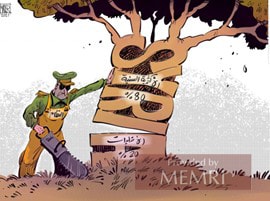
Syrian regime renounces Syria's "80% Sunni Majority" in favor of the "20% minority" (source: Al-Arab
Opposition Activists On Twitter: The Real Danger Is Iranian Penetration Of Syria's Religious Institutions
Similar criticism was voiced by oppositionists on Twitter. Syrian journalist Maher Sharf Al-Din, who is identified with the opposition, tweeted: "[The regime] used the Mufti's statement in which he distorted the Quran to prompt the Endowments Ministry into rapid action, so it would seem as though [the Ministry] had decided to abolish the position of Mufti [in response to this incident]. The whole thing is nothing but a play staged by Iranian puppets with the aim of completing the destruction of Syria's [Sunni] religious identity, including its most central symbols, which had already been crushed, such as the position of the Sunni Mufti." In another tweet he wrote: "In the coming days we will read about further decisions… that will use the abolition of this position to let Iran's agents penetrate deeper and deeper into Syria's religious life and continue manipulating the country's identity…"[13]
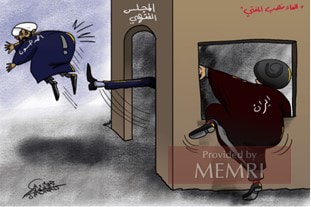
After Mufti "Hassoun" is kicked out of "Fiqh Council," "Iran" climbs in to take his place (source: Thelevantnews.com, November 17, 2021)
Ibrahim Al-Jabawi, member of the High Negotiations Committee, which represents the Syrian opposition in negotiations with the regime, tweeted: "This is just an opinion: Now that the position of Syrian Mufti has been abolished and a fiqh council has been appointed in his place, we will see two types of fatwas issued: Sunni ones and Shi'ite ones!!! You, the Syrian Muslim, will have to choose. You can be a Shi'ite, and then they will be pleased with you. Or [you can be a Sunni, and then] you will remain persecuted and your wings will be clipped."[14]
Human rights activist and researcher Mahmoud 'Uthman, who is likewise identified with the opposition, tweeted: "Assad has canceled the position of the republic's Mufti and transferred the role of issuing fatwas to the Endowment Ministry's Fiqh Council. A third of [the members of] this council are Iranian religious authorities, which proves that the next phase in Assad's efforts to 'Iranicize' Syria will require taking decisions that the Mufti alone cannot justify. It is Iran's religious and economic penetration that poses the [real] danger [to Syria], not [the Iranian] militias."[15]
Muhammad Sarmini, founder of the Istanbul-based Jusoor Institute, which is identified with the Syrian opposition, wrote in a series of tweets: "The goal of this [move] was not to punish Hassoun, but to change Syria's identity, which required abolishing the position of Grand Mufti and the other jurisprudential positions… The Syrian regime is acting to fundamentally change Syria's identity, so that it will no longer have… a Sunni majority. It has now become a diverse country whose various religious components are equal [in status] and all are all part of the committee [which serves as] the official jurisprudential religious authority… Iran's penetration of [Syria's] jurisprudential and judicial institutions, which [until now] were subordinate to the authority of the Sunni religious schools, heralds a very dangerous phase of erasing [Syria's] identity, after the demographic change that has taken place in the last ten years…"[16]
Some also called on the Islamic world, and especially on opposition elements and the Istanbul-based Syrian Islamic Council, to take measures in light of Assad's termination of the Mufti's position. Oppositionist journalist Ahmad Muwaffaq Zaidan tweeted: "The abolition of the position of Syria's Mufti by the Russian and Iranian occupation gang is another in a series of moves [aimed at] changing Syria's identity and demography… This is a very grave [development] that the Arab and Islamic world must oppose. It also disproves the claims some have been making, that Assad is expelling Iran from Syria."[17] In another tweet the following day, he wrote: "The decision to abolish the position of the Syrian Mufti is a decision of the occupiers at home and abroad, and it must be opposed by the Syrian Islamic Council and the by elites who care about Syria's identity. This must be done through domestic action, by appointing a Mufti on behalf of the [Syrian] revolution who will be supported by Syrian clerics and by Arab and Islamic clerical institutions…"[18]
Turkey-Based Syrian Islamic Council Appoints New Mufti
On November 20, 2021, five days after the publication of Assad's decree, the Syrian Islamic Council, which was founded in 2014 in Istanbul and is a source of authority for Sunni Syrian organizations opposed to the Assad regime, announced that it had appointed its head, Sheikh Osama 'Abd Al-Karim Al-Rifa'i, who is also a member of the Islamic Union of Muslim Scholars, as Grand Mufti of Syria. The council's spokesperson, Muti' Al-Batin, said that the Syrian regime has always conspired against the position of the Mufti: It began by transforming the Mufti from a position elected by the country's senior clerics into a position appointed by the President, and now it has completed the process by abolishing the position altogether. Al-Batin added that, after consulting with senior Syrian clerics, "the Islamic Council, as the body representing the clerics… decided unanimously to preserve this position and elect Sheikh Osama'Abd Al-Karim Al-Rifa'i as Syria's Grand Mufti."[19]

Left: Syrian Islamic Council spokesman announces Al-Rifa'i's appointment as Syria's Grand Mufti (source: Youtube.com, November 20, 2021); right: Sheikh Osama Al-Rifa'i (source: orient-news.net, November 21, 2021)
Sheikh Osama Al-Rifa'i, who also heads the Clerics Union of Al-Sham [Greater Syria] and is a member of the Islamic Union of Muslim Scholars, was born in Damascus in 1944. His father, 'Abd Al-Karim Al-Rifa'i, was a renowned cleric. In 1971, after completing his studies in the University of Damascus, Osama became a preacher at the 'Abd Al-Karim Al-Rifa'i Mosque in the city, which is named after his father. In 1981 he migrated to Saudi Arabia to escape the Hafez Al-Assad regime's persecution of the Muslim Brotherhood and of other Islamic movements, and returned to Syria only in 1993. When the Syrian uprising broke out in 2011, Al-Rifa'i supported it from its very first months, held anti-Assad protests in his mosque in Damascus and was vocal in his criticism of Assad and other regime officials. After being persecuted and even assaulted by the security apparatuses he migrated to Turkey. Since his appointment as head of the Syrian Islamic Council in 2014, he has served as the religious authority for the Islamic factions fighting against the Assad regime, especially in northern Syria.[20]
Al-Rifa'i is considered close to the Turkish regime and has praised its support for the Syrian opposition.[21] He is also known for his radical opposition to the Syria Democratic Forces (SDF) – an umbrella organization of mostly Kurdish forces, headed by the YPD Party, and Arab forces supported by the U.S.-led international coalition that is fighting ISIS in Syria – and at one point he even sanctioned jihad against the SDF.[22] In August this year he sparked a wave of criticism by voicing extremist positions against women in a Friday sermon he gave in the town of A'zaz while visiting northern Syria at the head of a delegation on behalf of the Syrian Islamic Council. In the sermon he warned against civil society organizations that spread un-Islamic ideas in the guise of dispensing humanitarian aid, and incited against Syrian women activists in these organizations who, he said, spread depraved ideas among local young girls, such as women's liberation and gender equality. [23]
On November 25, 2021, five days after his appointment as Grand Mufti of Syria, Al-Rifa'i delivered his first speech in this capacity, during a visit to Aleppo in the north of the country. In his speech he stressed that he had not wanted the position of Grand Mufti, but had relented after the Syria Islamic Council and the Syrian Jurisprudential Council insisted on it and selected him unanimously. By taking this measure, he said, the Syrian Islamic Council had restored the proper order of things, whereby the Mufti is elected by senior clerics and not by the regime, as had been the case in the past. He explained that the Mufti must be independent of the regime so as to be free in issuing fatwas.
In his first speech as Mufti, Al-Rifa'i apparently sought to convey conciliatory messages to all sectors of the Syrian people. He called for unity and cooperation among all the opposition factions and among all Syrians so as to attain the goals of the revolution, and added: "As long as we do not unite our ranks, we should not dream of victory." He stated that "the Syrian Islamic Council reaches out to all sectors of the Syrian people," regardless of religion, race and ethnicity, and noted that "in the past, we lived side by side with members of all religions in Syria, without sectarianism or racism, like a family – and we must restore this reality in our country." He also expressed his appreciation for Syrian women, who have suffered greatly in the past few years.[24]
Elements identified with the Syrian opposition welcomed Al-Rifa'i's appointment as Mufti. The Turkey-based Syrian Interim Government, which was founded in 2003 and represents the Islamic Syrian factions in northern Syria, issued a statement condemning Assad's move of abolishing the Mufti's position and transferring his powers to the Fiqh Council, "which includes authorities belonging to the Iranian militias." The statement added that this was "part of the [regime's] systematic abuse of the Syrian majority [in the country], which represents Syria's cultural identity and its authentic character… In light of this," it added, "we in the Syrian Interim Government appreciate and welcome the Syrian Islamic Council's decision to appoint the honorable Sheikh Osama 'Abd Al-Karim Al-Rifa'i as Grand Mufti. We stress the importance of this move and its emblematic significance in fighting the plans of the Assad regime and of the militias of the Iranian project in Syria."[25]
Salem Al-Meslet, chair of the National Coalition for Syrian Revolutionary and Opposition Forces, also welcomed Al-Rifa'i's appointment, tweeting: "The election of the honorable and learned Sheikh Osama Al-Rifa'i as Syria's Grand Mufti restores the importance, weight and influence of this position to what it was before the criminal regime took over Syria and turned [the Mufti] into someone who markets the regime…"[26] In another tweet on the following day, he wrote: "I had the honor of visiting the learned and honorable Sheikh Osama Al-Rifa'i, the Grand Mufti of the Republic. I congratulated him on receiving the trust of the Syrian clerics and the Syrian people thanks to his religious status, his illustrious religious record and his unforgettable positions against oppression and tyranny. For nobody has forgotten that he was the first to openly declare the demands of the revolution from the pulpit of his mosque in Damascus in the first week of the revolution."[27]
*H. Varulkar is director of research at MEMRI.
[1] The Alawite sect of Islam grew out of the Shi'a in the ninth century. The term refers to the fourth caliph, 'Ali Bin Abu Talib, whose followers founded the Shi'a. Most of the Alawites reside in northern Syria today, where they number about three million, consisting 11% of the country's population.
[2] On the Shi'ization of Syria, see MEMRI reports: Inquiry & Analysis No. 1131 - Shi'ization Of Syria: In Damascus, Unprecedentedly Extensive Observance Of The 'Ashura – November 13, 2014; Inquiry & Analysis No. 1280 - Together With Its Allies, The Syrian Regime Is Forcing Demographic Change In Areas Of The Country - For Self-Protection And Self-Preservation – November 15, 2016; Special Dispatch No. 8629 – Syrian Journalist: Education Agreement With Syria Will Allow Iran To Control Syrians’ Minds, March 12, 2020.
[3] Sana.sy, October 12, 2018.
[4] Article 2 says: "The functions of the Fiqh Council… will [henceforth] also include the following: Establishing the beginning and end of the lunar months; following the [phases of the] moon… and issuing the relevant rulings regarding the Islamic rituals and prayers; issuing religious rulings based… on the Islamic shari'a of all the Islamic schools, and establishing the principles, criteria and mechanisms required in order to regulate these rulings…"
[5] Sana.sy, November 15, 2021; Al-Watan (Syria), November 16, 2021.
[6] The statement clarified further that, according to the standard interpretation of this verse, it conveys that Allah created Man, who is the center of creation, in the best possible way, but whoever violates His commandments becomes the lowest of the low. Raialyoum.com, November 14, 2021; mow.gov.sy, November 11, 2021.
[7] Alhurra.com, dw.com/ar, syria.tv, November 16, 2021; raialyoum.com, November 14, 16, 2021; snacksyria.com, November 13, 2021.
[8] Al-Quds Al-Arabi (London), November 17, 2021.
[9] Alaraby.co.uk, November 19, 2021.
[10] Imama, one of the tenets of the Shi'ite faith, states that Allah appointed leaders (imams) to guide humanity. Divinely inspired and infallible, these imams dispensed perfect justice and were perfect role models.
[11] A temporary marriage for the purpose of sexual relations, sanctioned by Shi'ite Islam.
[12] Zamanalwasal.net, November 16, 2021.
[13] Twiiter.com/mahersharafeddi, November 16, 2021.
[14] Twitter.com/ibrahimjbawi0, November 16, 2021.
[15] Twitter.com/mahmoudothman85, November 16, 2021.
[16] Twitter.com/mohsarimi, Noveober 16, 2021.
[17] Twitter.com/Ahmadmuaffaq, November 16, 2021.
[18] Twitter.com/Ahmadmuaffaq, November 17, 2021.
[19] Enabbaladi.net, iumsonline.org, November 20, 2021.
[20] Orient-news.net, November 21, 2021; arabi21.com, May 5, 2021.
[21] Aa.com.tr, November 4, 2021.
[22] Snacksyrian.com, February 28, 2018.
[23] On this sermon and the criticism it sparked, see MEMRI Inquiry and Analysis No. 1607 – Syrian Women's Organizations And Women's Rights Activists: Islamic Opposition Organizations Backed By Turkey Are Inciting Against Us, Putting Our Lives In Danger, November 24, 2021.
[24] Orient-news.net, Syria.tv, nedaa-post.com, November 25, 2021.
[25] Syriaig.net, November 20, 2021.
[26] Twitter.com/pofsoc, November 21, 2021.
[27] Twitter.com/pofsoc, November 22, 2021.



